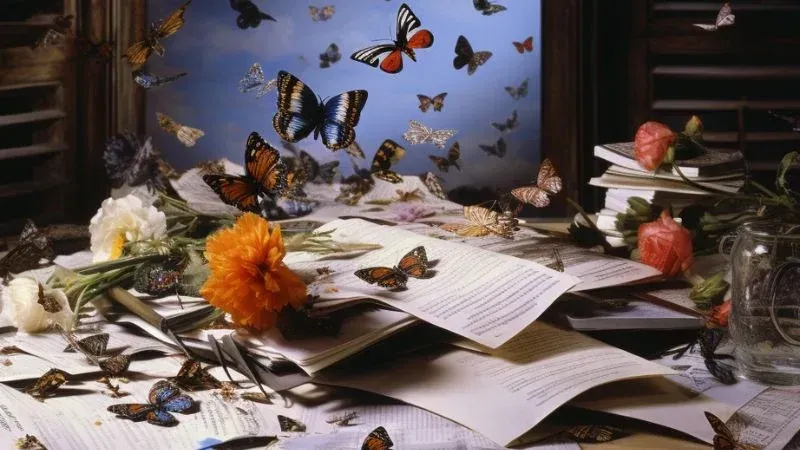
Revealed - How Are Clutter And Trauma Related?
Has anyone ever uttered the phrase to you, "a cluttered mind in a cluttered space "?
Watch this YouTube episode, or read below:
The human mind and body are a combination of complexity and sophistication. They are intricately interwoven, creating our experiences and therefore writing the threads of memories, emotions, and perceptions.
In this blog, we explore the captivating bond between clutter and trauma, unveiling the intricacies that shape our emotions and pave the path to personal growth.
Distant cousins and seemingly unrelated… Clutter and trauma wield the limitless power to rewire our cognition puzzle, reshaping our very thought fabric, ingrained habits, and multifaceted behaviors, thereby molding the very lens through which we see the world—the very paradigms that define us.
First, let's establish a common ground for our journey together.
Trauma is a word that we frequently hear in conversations, see in social media, and in health and wellness spaces.
But, what does it really mean?
And similarly, we talk a lot about clutter, but what does it signify beyond a messy room?
The Enigma Called Trauma
Trauma goes beyond just an emotional response.
Trauma describes how we feel after something really bad happens. It's like falling off your bike and scraping your knee.,
That, but with pain, impacts, triggers, … that can go much deeper…
When stress takes over, it creates a domino effect in our brain.
It’s like having a jug or bucket. If we keep adding water (stressors) to our jug or bucket, the water will eventually overflow.
It sets off a chain reaction that can actually trigger changes in how our brain processes information and emotions.
It's pretty fascinating how our brain can adapt and rewire itself in response to stress and trauma.
As these changes occur, they start to affect our thought patterns, habits, routines, and behaviors. It's like our brain is trying to cope with the emotional turmoil by rewiring itself.
The hard truth is that trauma is pervasive.Trauma's impact is something that goes beyond just one person's experience. It's widespread, touching so many lives and leaving deep scars on the minds and bodies of millions.
It's like encountering a dark storm that shakes us to our core, leaving a permanent imprint on our minds.
And all these changes, in turn, influence the way we feel and act, and forever alter our perception of the things around us.
The Intricacy of Clutter
From trauma, we now turn to the concept of clutter, an equally emotionally laden term.
It's not just an excessive accumulation of things but a complex mental framework.
When we speak of clutter, we often picture a chaotic space overflowing with items.
However, it's more than simple chaos..,
Have you ever peeked under your bed or opened a closet, only to find things you don't need or even remember?
Clutter is an undesirable, sometimes even damaging state, hinting at a sense of being crowded, untidy, or disorganized.
When we surround ourselves with disorder, focusing on tasks and maintaining efficiency becomes truly difficult.
Furthermore, the social implications of clutter are equally significant. A cluttered home might trigger feelings of embarrassment, isolation, and strained relationships with our loved ones.
The Relationship between Clutter and Trauma
Now you might wonder, with these definitions laid out, what do clutter and trauma have to do with each other?
You might be surprised.
Well.., imagine clutter and trauma as two rivers that merge into one. Over time, their currents flow together, affecting our thoughts and behaviors, ultimately shaping the landscape of our lives..
Believe it or not, here's another startling revelation: Many survivors of trauma find their homes teeming with clutter.
This is not a mere coincidence but a subconscious method to cope with their past traumatic experiences.
Trauma triggers can significantly contribute to clutter accumulation.
Environmental stress emerges as a key factor that mediates the trauma-clutter relationship. Clutter-filled spaces activate the brain's stress response, and for trauma survivors, this response intensifies in disorganized settings.
Sometimes, people who have faced trauma find clutter comforting.
The clutter serves as a tangible reminder of the trauma, a safety blanket. It's like building a fort of toys around you, making you feel safe and in control. Clutter becomes a silent friend that keeps memories of the past alive.
It makes things seem familiar, acting as a link to their past trauma and the emotions tied to it.
Though clutter and trauma may appear unrelated at the surface, they possess the power to reshape our mindset, habits, routines, and behaviors.
Understanding this connection between clutter and trauma is the first step in addressing these issues.
Awareness of this profound interplay between clutter and trauma unveils the path to healing.
Embarking on this transformative voyage.., opening up to the idea of decluttering.., we cast away the accumulated emotional luggage, freeing our souls from the burden of ages, and birthing a harmonious home for a tranquil spirit.
The undeniable connection between clutter and trauma reveals complex dynamics that impact our minds. By understanding this link, we can seek solutions and start the journey toward a healthier life.
How Clutter and Trauma Affect Our Brains
Our brain is like the boss of our body. It helps us think, feel, and do everything we do.
But when trauma comes in like a storm, it can change how our brain works. It's like a rainstorm causing a big mess in our brain's control room.
Similarly, clutter can also confuse our brains.
Imagine trying to do your work in a room full of distractions, noise, and mess... You'd find it hard to concentrate, right?
That's how our brains feel with clutter around!
But guess what?
We can beat the clutter and let go of the grip of trauma.
It's like cleaning up our room and nursing a wound.., it takes time, care, and lots of love, but we can do it!
Seeking support is also just as valuable.These resources can provide guidance, validation, and practical strategies to navigate the complexities of clutter and trauma.
If you're interested in understanding more about the connection between clutter and trauma, we recommend you read "Put That Stuff Down" and its sequel. These books explore the complex relationship between trauma, PTSD, and decluttering, offering personal stories, psychological insights, and practical advice. They highlight the importance of readiness and commitment in embarking on the decluttering journey.
Sometimes, cleaning up a big mess and healing a deep hurt can be too hard to do alone. That's when we can ask for help.
Don’t be afraid to embrace the courageous path of seeking support. Remember, asking for help is a super brave thing to do!
The Power of Decluttering
Decluttering is a special word that means cleaning up clutter. It's like having a magic wand that can make our mess disappear.., leaving our spaces and minds fresh and bright.
When we declutter, we can think better, feel better, and be our best selves!
Just imagine your room clean and neat.., with your favorite things in their place, and lots of space to dance, play, and dream.
That's the magic of decluttering!
Now, we understand..,
.. How we wish that everything is just as easy, that we can just close our eyes and when we open them, “Ta-da! The clutter is all gone”., but healing trauma and decluttering are ongoing processes.
Life is a journey, so as decluttering.
And on this journey, clutter and trauma might try to join us.
However..
.. “We are the captains of our ship, and we get to decide who or what gets to travel with us.”
So let's take a step forward today! Let's say goodbye to clutter, heal our hearts, and invite joy and peace to be our forever companions.
Check out the book Put That Stuff Down on this exact subject and way more…
Dear readers, we deserve a journey filled with love, laughter, and lots and lots of happy memories!




